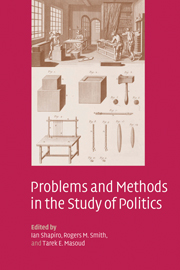Book contents
- Frontmatter
- Contents
- List of contributors
- Acknowledgments
- 1 Introduction: problems and methods in the study of politics
- Part I Description, explanation, and agency
- Part II Redeeming rational choice theory?
- Part III Possibilities for pluralism and convergence
- 12 The illusion of learning from observational research
- 13 Concepts and commitments in the study of democracy
- 14 Problems chasing methods or methods chasing problems? Research communities, constrained pluralism, and the role of eclecticism
- 15 Method, problem, faith
- 16 Provisionalism in the study of politics
- 17 What have we learned?
- Index
- References
15 - Method, problem, faith
Published online by Cambridge University Press: 22 September 2009
- Frontmatter
- Contents
- List of contributors
- Acknowledgments
- 1 Introduction: problems and methods in the study of politics
- Part I Description, explanation, and agency
- Part II Redeeming rational choice theory?
- Part III Possibilities for pluralism and convergence
- 12 The illusion of learning from observational research
- 13 Concepts and commitments in the study of democracy
- 14 Problems chasing methods or methods chasing problems? Research communities, constrained pluralism, and the role of eclecticism
- 15 Method, problem, faith
- 16 Provisionalism in the study of politics
- 17 What have we learned?
- Index
- References
Summary
The shape of contending problematics
The question we are invited to address, as I understand it, is whether it is better to be governed in research by the imperative of a method or the pressure of a political problem. I suppose those who give primacy to method would say that they focus on issues most congenial to the favored method to build a reliable fund of knowledge that can later be brought to bear on problems that now seem intractable. Those who give primacy to the problem might say that critical issues – such as the sources of terrorism, the sources of urban crime, the rise of cross-state religious fundamentalism, or the effects of global capital – need to be engaged now, even if popular methodological approaches are not currently well equipped to respond to them. Stated in this way, I go with those who give priority to the problem.
My sense, however, is that the question reflects a presupposition in need of examination: that those who focus on problems and those who focus on method can be separated neatly. To me, an intervening “variable” compromises the question. Let me put it this way: a particular orientation to method is apt to express in some way or other a set of metaphysical commitments to which the methodist is deeply attached; and a close definition of a political problem is apt to be infiltrated by similar attachments. I do not mean anything technical by “metaphysical commitment” in this context.
Information
- Type
- Chapter
- Information
- Problems and Methods in the Study of Politics , pp. 332 - 349Publisher: Cambridge University PressPrint publication year: 2004
References
Accessibility standard: Unknown
- 43
- Cited by
